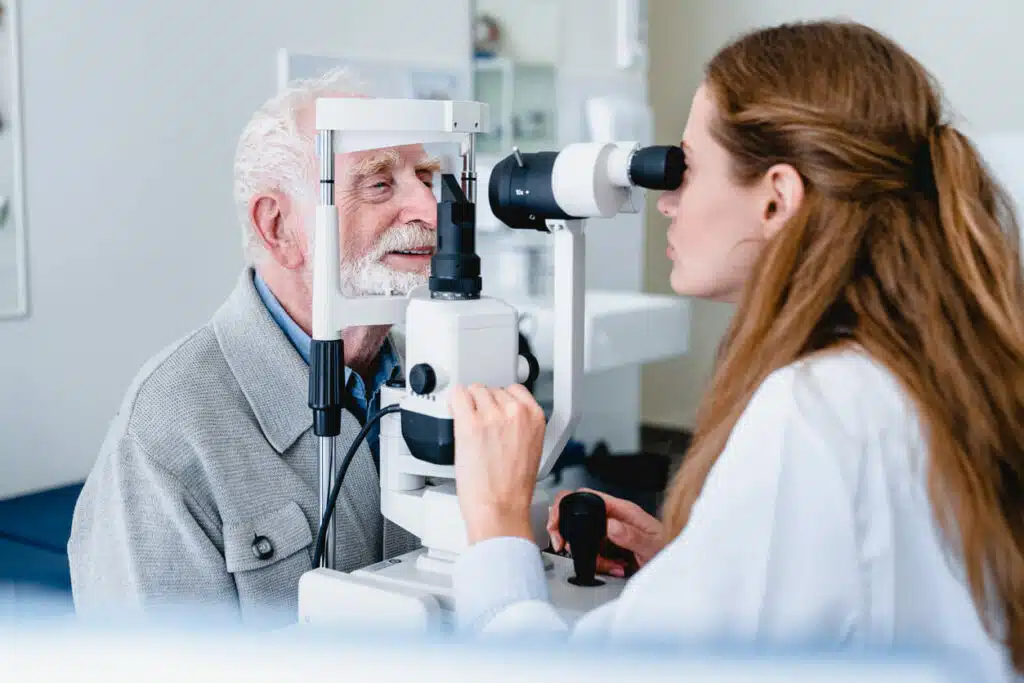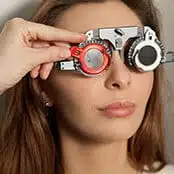
When it comes to keeping your eyes healthy, two big concerns many people face are diabetes and macular degeneration. Both of these conditions can seriously affect your sight. If you have both, it is like facing a double challenge.
Let’s break down what these conditions are, how they are connected, and what you can do to keep your eyes as healthy as possible.
What Diabetes Does to Your Eyes
A condition like diabetes makes it hard for your body to control sugar levels in your blood. High sugar levels over time can harm many parts of your body, including your eyes.
One common eye problem for people with diabetes is called diabetic retinopathy, where the tiny blood vessels in the back of your eye (the retina) get damaged.
This can lead to swelling in a part of your retina called the macula, making it hard to see details.
Age-Related Macular Degeneration (AMD): A Common Cause of Vision Loss
Macular degeneration, especially the kind that happens as people get older (called age-related macular degeneration or AMD), is another major reason why people might lose their vision.
It mainly affects the macula, the part of your eye that lets you see fine details. AMD can make it harder to read, drive, or see people’s faces.
Age-related macular degeneration (AMD) comes in two forms. The more serious type, wet AMD, involves leaky blood vessels that can significantly harm your vision.
When Diabetes and Macular Degeneration Mix
Diabetes and macular degeneration can make each other worse. Having diabetes might heighten your risk of developing AMD and lead to faster progression.
Both conditions share some underlying problems, like inflammation and issues with blood vessels, which is why it is important to tackle both head-on if you are at risk.
Steps to Take for Healthier Eyes
If you are dealing with these conditions or want to prevent them, there is a lot you can do:
Keeping Blood Sugar in Check
For people with diabetes, controlling blood sugar levels is non-negotiable.
Using tools like continuous glucose monitors or working closely with your doctor to adjust your insulin can help keep your blood sugar steady.
This reduces the risk of damage to the tiny blood vessels in your eyes, helping prevent complications down the line.
Managing Cholesterol and Blood Pressure
High cholesterol and high blood pressure are not just bad for your heart—they can also harm your eyes.
Taking steps to manage these, whether through medication, diet, or exercise, can help reduce the risk of eye problems related to both diabetes and macular degeneration.
The Right Vitamins and Nutrients
Certain vitamins and minerals have been shown to help slow down the progression of macular degeneration. Some supplements may help, but always check with your doctor first.
Advanced Treatments
Treatments like anti-VEGF injections can make a big difference for people with wet macular degeneration or diabetic macular edema, helping to slow down vision loss.
There are also laser treatments available for certain types of eye problems caused by diabetes.
Healthy Habits
Exercising regularly, not smoking, and eating a diet rich in omega-3 fatty acids, leafy greens, and colorful fruits and vegetables are all good for your eyes.
These lifestyle choices support overall health and can specifically help manage diabetes and reduce the risk of macular degeneration.
When to Visit an Ophthalmologist
Understanding when to seek the expertise of an ophthalmologist is a crucial step in managing AMD effectively.
Early Detection
It is crucial to get your eyes checked every year. The check-ups involve looking at the back of your eyes after dilating your pupils, which helps catch any signs of trouble early on.
Catching problems such as diabetic retinopathy or macular degeneration early means treatment can start sooner, which is key to keeping your eyes as healthy as possible.
Early detection is paramount in slowing the progression of the disease and preserving vision.
Recognizing Symptoms
Symptoms indicative of macular degeneration include:
- Distorted or blurry vision
- The appearance of dark areas in your visual field
- A gradual loss of color vision or clarity
It is also common for individuals to experience difficulty adapting to low light levels and noticing that straight lines appear wavy or bent.
These symptoms warrant immediate consultation with an ophthalmologist near you for a thorough assessment.
The Role of the Ophthalmologist
Ophthalmologists are medical doctors who specialize in the diagnosis, management, and treatment of eye diseases, including macular degeneration.
They possess the expertise to conduct advanced diagnostic tests, such as optical coherence tomography (OCT) and fluorescein angiography, to ascertain the presence and extent of AMD.
Based on the diagnosis, they can recommend a tailored treatment plan, which may include pharmacotherapy, such as anti-VEGF injections, and lifestyle modifications to mitigate risk factors.
Macular Degeneration Treatment Near Me in Washington, MO
Facing diabetes and macular degeneration together might seem daunting, but there is hope. With regular eye exams, taking care of your overall health, and staying informed about treatment options, you can fight back against these threats to your vision. As experts in eye care, we are here to help guide you to protect your sight, every step of the way.
You can trust Advanced Sight Center if you need personalized macular degeneration treatment near you. Call us today at (636) 239-1650 if you have any questions about our services. You can also fill out our online appointment request form if you wish to book a visit.
We look forward to serving you!




